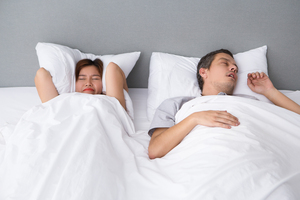05 Sep What Causes Sleep Apnea?
Maybe your doctor is talking to you about sleep apnea. If so, you are not alone. According to the American Medical Association, up to 30 million people suffer from this disorder. At Crosspointe Sleep Solutions, we have helped hundreds of people sleep better and wake to a brighter day.
Before choosing the right solution, you need to understand the problem.
1. Narrowed Airways

One of the more common reasons for sleep apnea is narrowing your airways. When we sleep, everything relaxes, including the muscles around the throat. When people with narrowed airways relax, the tissue can collapse. The airway becomes blocked, and the sleeper can no longer breathe. There are several reasons for narrowed airways. Allergies and throat issues such as enlarged tonsils or adenoids can block airways. Sometimes, people are born with thicker tongues that can fall backward in the mouth. In addition, muscles and fat around the neck can put pressure on airways and narrow them over time.
2. Snoring
While many people will occasionally snore, such as when they have a cold or allergies, snoring could also be a cause of a more significant problem. Chronic snoring is a sign of narrowing around the soft palate. Your soft palate is the tender tissue at the back of the mouth. When the sleeper relaxes, the soft palate drops. As the sleeper breathes, the palate flutters back and forth, causing the trademark sound of snores. But snoring is more than just irritating. When the palate drops completely, it blocks the top of the throat, cutting off breath and sleep apnea.
3. TMJ
Temporomandibular joint issues, otherwise known as TMJ, is a common factor in sleep apnea. In fact, about 75% of people who have TMJ also have sleep apnea. The damage done to the joint allows the jaw to fall backward, blocking the airway. When it becomes difficult to breathe, the body naturally clenches the jaw or bites down in an attempt to clear the throat. Unfortunately, this further damages the joint, which causes it to collapse more often, creating a vicious cycle.
So how does Crosspointe Sleep Solutions correct these issues? One of the less invasive treatments is called Oral Appliance Therapy, or OAT. With no bulky machines, these small, custom pieces fit inside your mouth and correct the issues that cause your sleep apnea.
If you suffer from sleep apnea, come and talk to Dr. Coerver. She can help you get to the root of your sleep problems and get you back to a restful night’s sleep.
